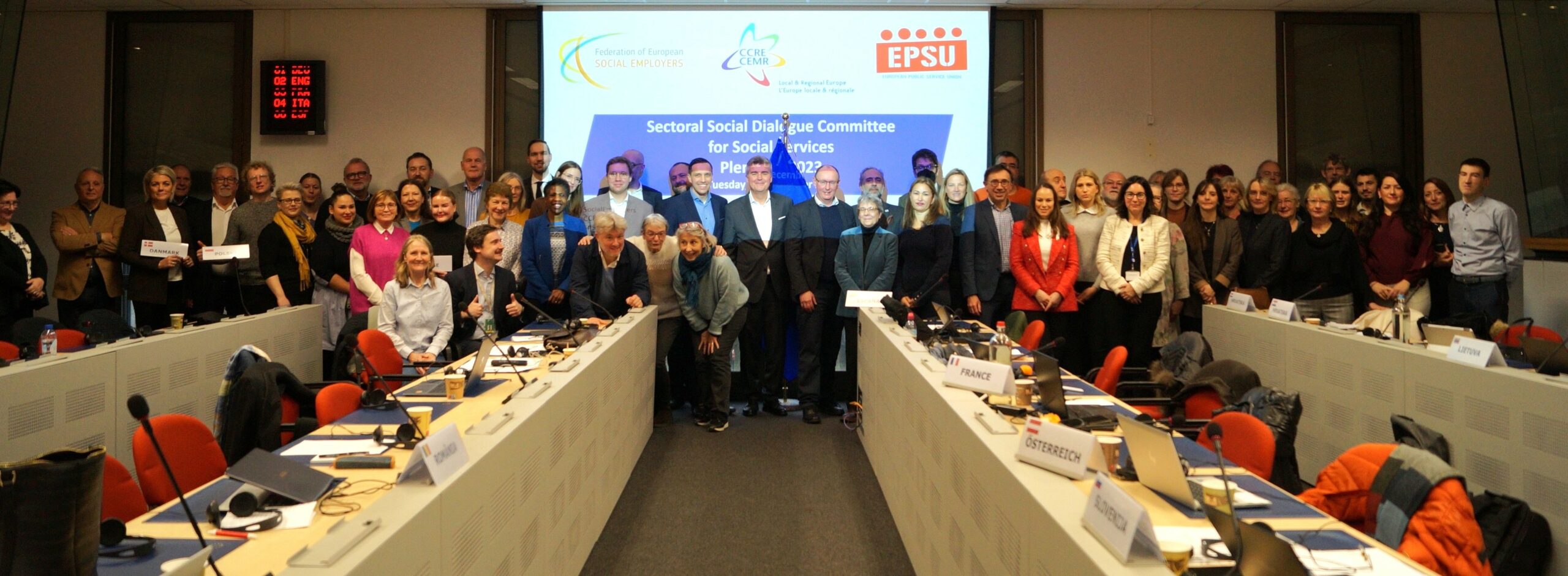European Sectoral Social Dialogue Committee for Social Services: Social Partners come together for first Plenary Meeting

On 12 December, the Federation of European Social Employers (Social Employers), the Council of European Municipalities and Regions (CEMR), for the employers’ side and the European Federation of Public Service Unions (EPSU), held their first meeting in the framework of the Sectoral Social Dialogue Committee for social services.
The new European Sectoral Social Dialogue Committee for social services aims to ensure better working conditions for over 9 million social services workers in the EU 27 and the provision of accessible, affordable high quality social services.
Today’s meeting marks a significant step in the dialogue between employers and employees‘ representatives to address key issues in the social services sector.
The European Commissioner for Jobs and Social Rights, Nicolas Schmit, opened the Committee meeting stating that “Social dialogue faces challenges in Europe, starting from the decrease in the rate of collective bargaining to the need to involve more social partners in policy making. And the care sector is one example where more can and should be done. (…) This Committee can help to strengthen collective bargaining and bipartite agreements especially in the Member States where this is non-existent. I am Confident that your endeavours will result in better working conditions in the sector and in improvement in high-quality and accessibility of social services provided to millions of European citizens”.
Representatives from the Social Employers, EPSU and CEMR also welcomed the new Committee:
Gregor Tomschizek, President of the Social Employers said: “Today is a historic day for the European social services sector. Through this new Sectoral Social Dialogue Committee, social partners engage to work together to ensure better working conditions, which will allow the sector to attract and retain a more skilled workforce. The Social Employers look forward to a positive and fruitful cooperation, as social partners”.
Dietmar Erdmeier, Vice President of the EPSU Health and Social Services Standing Committee, declared: “We have set ourselves as employers and trade unions ambitious goals including ensuring the implementation of the Recommendations on Long-Term care. These recommendations address low pay, low collective bargaining coverage and lack of quality jobs resulting in staff shortages for example. EPSU looks forward for joint outcomes to improve the quality care workers deserve to deliver and users of services deserve to receive”.
Mark Elxnat, Chair of Expert Group Local and Regional Governments as Employer within the CEMR, stated: “We look forward to discussing and finding ways for improving the working conditions in the important area of social services. A working social infrastructure with well organised social services is a key factor for achieving a good livelihood. The most urgent problem we face, is the lack of a skilled workforce today and tomorrow and as social partners, it is our goal and duty to join forces to improve this condition”.
During the meeting, the social partners adopted the Rules of Procedure for the Committee, as well as the work programme for the period 2024-2026. This was followed by a discussion on which topics to address as priority. The Committee will focus on 4 main topics, which include sub-themes, objectives and deliverables.
The work programme for 2024-2026
- Retain and attract social services’ workers
– Workforce diversity
– Job evolution
– Working conditions
- Capacity building
– Social services social partners capacity building
- Public procurement
– Socially responsible public procurement for social services.
- European Care Strategy follow-up
– Workforce and skills aspects of the care strategy
The actions included in the work programme are all referrable to the overarching principles of the European Pillar of Social Rights and aim to contribute to its implementation. The planned joint work will also help to deliver on the EU Care Strategy and on the Pact for Skills and the large-scale skills partnership for long-term care. The latest updates on both initiatives were presented by European Commission representatives and discussed with social partners during the meeting.
The meeting was concluded with the presentation of the Social Employers and EPSU joint work in past and current EU-funded projects. These projects aim to strengthen social dialogue, build social partners’ capacity, improve working conditions, skills and training in the sector: FORESEE, FORTE and IWorCon.
Note to editors
The Federation of European Social Employers (Social Employers) represents employers in the social services sector at European level and has the most significant employer’s representativeness in the private sector part of social services. The Federation’s objectives are to strengthen the position of employers in social services at European and national level, establish common positions between members, and negotiate with European Trade Union Associations, representing workers in social services.
The European Federation of Public Service Unions (EPSU) brings together trade unions from across Europe and represents over 8 million public service workers. It is the most representative European trade union organisation in the social services sector. EPSU works hard to deliver better working conditions, improved health and safety and enhanced rights for its members. By sitting down with employers at European level, we negotiate best practice agreements that improve the working lives of public service workers and ensure quality services for citizens.
The Council of European Municipalities and Regions (CEMR) is the broadest European association of local and regional governments. We are the only organisation that brings together one million democratically elected European politicians, in 60 member associations from 40 countries since 1951.
Since its creation in 1951, CEMR promotes the construction of a united, peaceful and democratic Europe founded on local self-government, respect for the principle of subsidiarity and the participation of citizens.
